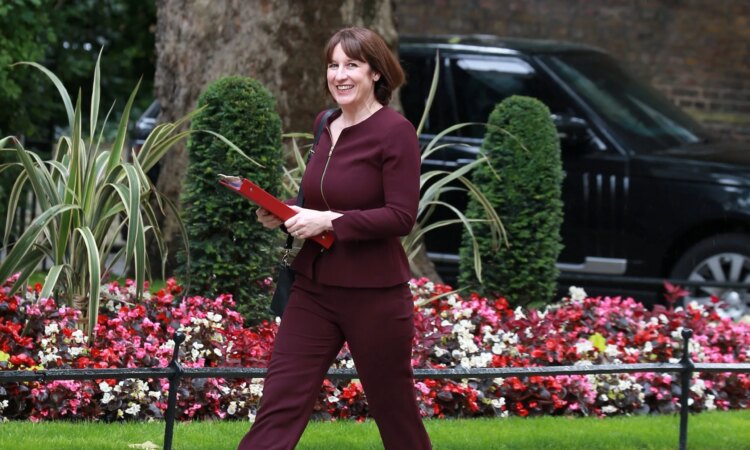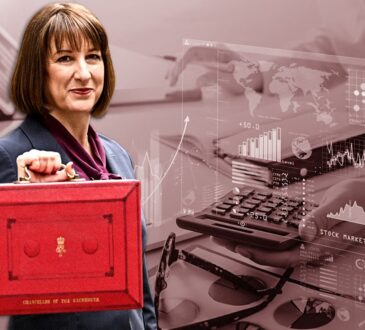
14 November 2025: Reeves Shelves Income Tax Hike
Reports across today’s media, led by an article in the Financial Times, suggest that the Chancellor, Rachel Reeves, has ditched plans to raise income tax in her Budget on 26 November.
The Treasury does not comment on the likely content of the Budget ahead of the speech. But analysis by the Office for Budget Responsibility of improvements in government tax receipts has prompted speculation that the ‘black hole’ in the public finances could be smaller than feared, reducing the need for drastic measures.
Labour’s general election manifesto contained a commitment not to raise income tax, employee national insurance contributions or VAT (see stories below). The fall-out had such a move been made would have been politically damaging at a time when the party is trailing in the polls.
That said, the Budget will still need to raise revenue, both to reduce the government’s dependence on expensive borrowing on bond markets and to fund its plans to stimulate the economy. With income tax seemingly off the table, experts are speculating what other changes might be made.
Sean Drury, partner at accountants Blick Rothenberg, said: “Reeves’ will need to scrabble about with a range of relatively small but highly emotive tax policies to fill the fiscal black hole. We are drawing ever closer to the Autumn Budget and there doesn’t seem to be a clear game plan for raising the money needed.”
Among the possible changes to the tax regime, Drury highlights an extension of the existing freeze on allowances beyond 2028. If, for example, the personal allowance is held at £12,570, more employees and, crucially, pensioners will be drawn into paying 20% tax as their income increases.
The same applies to the levels at which employees begin to pay higher rate (40%) and additional rate (45%) tax – £50,270 and £125,140 respectively.
Another option would be to reduce the income tax bands so that tax is payable sooner. Drury says: “She could reduce the personal allowance to £10,000 and then, for simplicity, people start paying 40% income tax when they hit £40,000 and 45% at £100,000. But this would bring at the very least 4.1million pensioners into paying tax.”
A further measure would be to align the tax on share dividends with rates of income tax. At present, those in the 20% tax band pay 8.75% tax on dividend income above the £500 annual allowance. The respective figures for 40% and 45% taxpayers are 33.75% and 39.35%.
Further steps could also see changes made to profits made on the sale of second homes and business assets, so that they are treated as income rather than capital gains and taxed at higher rates.
Drury said holding income tax rates at current levels will change the whole tenor of the Budget: “It is likely that we will get minor tinkering, not dealing with the major issues on either spending or revenue raising, and the can is kicked down the road for another fire drill next year.”
If you have any thoughts on this story and the upcoming Budget, please contact us via getintouch@forbesadvisor.com
11 November 2025: Reeves Backs Benefit Reform As LibDems Seek Hospitality VAT Cut
With the Budget now just over two weeks away, Chancellor Rachel Reeves is giving clearer indications of her plans for tax and spending, writes Kevin Pratt.
Speaking to the BBC, she said the government will act on child poverty, particularly with regard to larger families. This is likely to mean the removal of the two-child cap on the receipt of certain benefits, although whether it will be set higher or payments will be tapered for additional children is not known.
The cap was introduced by the Conservative government in 2017. Its removal would be a way to placate critics from within the Labour party who oppose her apparent intention to break last year’s manifesto commitment not to raise income tax, employee National Insurance contributions (NICs) or the rate of VAT.
She told the BBC’s Matt Chorley that honouring the manifesto would require deep cuts in public spending, which she has effectively ruled out since that would harm prospects for economic growth.
The Liberal Democrats have called for VAT on the hospitality industry to be cut from 20% to 15%, and for the removal of an environmental ‘renewables obligation’ levy from domestic energy bills that would, says the party, cut over £90 from an average household’s annual energy costs.
The measures, which would remain in place until April 2027, would cost £12 billion, which the party says would be more than covered by a windfall tax on ‘big banks’. It calculates that such a levy could raise £30 billion by 2030.
See story below for predictions on how Reeves might raise taxes to bolster the UK’s public finances.
According to The Telegraph, the Chancellor has ruled out reducing the amount that can be withdrawn as a tax-free lump sum from a pension fund. At present, those aged 55 and over can take 25% of their pot as tax-free cash up to an overall limit of £268,275.
However, there have been rumours that the government is mulling a reduction in the amount employees can contribute to their pension, via salary sacrifice, without paying NICs. Such a move would result in employers also paying higher National Insurance bills unless staff reduced their contributions.
Tom Selby at investment house AJ Bell welcomed the report: “Attacking tax-free cash would have been a massive own goal, raising little money and causing uproar from young and old alike.
“While any changes to pension tax relief would almost certainly come with protections for those close to retirement, it’s entirely understandable that people are concerned by the speculation in recent months. When you save diligently throughout your career, you deserve the right to plan ahead without the threat that the government may move the goalposts before you can access your money.
“Constant rumour and speculation will damage confidence in long-term saving, lead people to make short-term decisions that may be bad for their long-term financial health, and cause wariness about household spending choices for fear that government tinkering may upend financial plans.
“How many people will have taken a ‘wait and see’ approach to booking a holiday of a lifetime or pressed pause on a house refurbishment because they can’t trust the government not to make a mess of their financial plans?”
Selby wants the government to pledge not to change tax-free cash entitlements or tax relief on contributions, at least for the rest of this Parliament.
Research from Unbiased, a financial advice platform, suggests over half of Britons (51%) feel pessimistic about the Budget.

Source: Unbiased
The study of more than 1,100 UK adults shows that pension tax relief, inheritance tax and property levies top the list of concerns, with those aged 35–44 (66%) and over 65s (62%) the most anxious about potential financial changes.
If you have any thoughts on this story and the upcoming Budget, please contact us via getintouch@forbesadvisor.com
4 November 2025: Chancellor’s ‘Scene-Setting’ Speech Paves Way For Tax Hikes
Our first 2025 Budget preview (see below) was published when the government’s manifesto pledge not to hike income tax, employee national insurance contributions or VAT seemed absolutely rock solid, writes Kevin Pratt.
But in an unprecedented ‘scene-setting’ speech ahead of her Budget on 26 November, Chancellor Rachel Reeves today seemed to confirm that the government will jettison that commitment, saying: “If we are to build the future of Britain together, we will all have to contribute to that effort”.
Last week, given the opportunity to reaffirm the manifesto promise at Prime Minister’s questions, Sir Keir Starmer merely said the government’s plans will be revealed in the Budget. In today’s speech, Reeves provided no details of the measures she will reveal at the despatch box later this month.
She needs to raise money to plug a hole in the nation’s finances – and a deeply controversial increase to income tax is thought to be on the cards. That would hit employees, landlords, some pensioners and those with substantial amounts in savings accounts – in short, anyone with income above their tax-free allowance.
Laura Suter at investment house AJ Bell says the government will have to make difficult decisions to balance the books: “With an estimated shortfall of £30 billion, it’s not going to be an easy gap to plug. While tinkering with other taxes may raise small amounts here and there, an increase to income tax raises a big chunk of money in one move – approximately £7bn by HMRC’s own estimates.”
What about the political backlash? Suter argues that, while millions of people would be affected, the impact on most individuals would be relatively modest: “A move that hits every income taxpayer in the UK is not going to go down well with the public. But with a cost of just over £1 a day for those earning around £50,000, it’s unlikely to lead to protests in the street and persistent headlines in the papers, like we saw with farmers after last year’s changes to inheritance tax.”
If Reeves decides to target income tax, she still has options. She could raise the basic rate from 20p to 21p, for example, which would result in up to £377 in extra tax being paid per individual. That would bring in just around £23 billion over the next three years.
If she also boosted the higher rate tax rate from 40% to 41%, she’d raise a further £1.6 billion a year, while increasing the additional rate from 45% to 46% would bring in £145 million extra per annum.
The cost of a 1p rise in basic rate income tax

Source: AJ Bell. Annual income tax bill based on income taxpayer with the standard personal allowance. Rounded to nearest £1. Taxpayers over £50,270 would incur the maximum £377 increase. Those with earnings over £100,000 would be hit by the additional cost of the loss of personal allowance.
The left-leaning think-tank, The Resolution Foundation, has suggested that matching any increase in the basic rate of income tax with a similar reduction in employee national insurance contributions would leave employees unaffected.
But Suter says those who do not pay national insurance contributions would lose out: “It would raise overall tax rates for pensioners, landlords, savers and perhaps those with dividend income too, while offsetting the impact on workers. Given the manifesto pledge focused on workers – a definition the government tied itself in knots trying to pin down – the chancellor may argue this policy raises taxes without breaking the spirit of the pre-election promise.”
One thing that seems certain to be among the upcoming Budget’s revenue-raising measures is an extension of the freeze on income tax thresholds beyond the current date of 2028. If the thresholds are static, more people who get pay rises move into a higher band and pay more tax as a result.
17 October: Rumours abound about Rachel Reeves’ upcoming Autumn Statement. Here’s a run-down of what she might do
When the Chancellor presents her Budget on 26 November 2025, the UK will hold its breath. Rachel Reeves has a huge task in terms of balancing the nation’s books, but the prospect of steep tax rises and deep public spending cuts is causing widespread concern, writes Kevin Pratt.
Labour was elected last year with a manifesto pledge not to increase income tax, national insurance contributions or VAT. If we assume she’s going to stand by that commitment – imagine the flak she’d get if she didn’t – then what other money-raising measures are at her disposal? And what might they mean for your household budget and financial well-being?
TAX
An increase in income tax may be off the cards, but the Chancellor can still raise tax in many other ways. For example, she could extend the freeze on income tax thresholds beyond the current date of 2028, which would effectively push some of those who get pay rises into a higher tax bracket – if you hear the phrase ‘fiscal drag’ in the coming weeks, that’s what it’s referring to.
But the government wants more revenue now, so we could see changes to inheritance tax and capital gains tax, either via increased rates or reduced tax-free allowances.
Tweaks to the Stamp Duty Land Tax (SDLT) regime in England and Northern Ireland are another possibility, with reductions in the thresholds increasing what buyers have to pay. There have also been suggestions that property sellers might be targeted with a tax grab on gains made on the sale of a principal residence – a deeply controversial proposition that some fear would bring an already flat housing market to a grinding halt.
Some on the political left have also called for a wealth tax to be levied on the very rich. For example, pressure group Tax Justice UK is calling for a 2% levy on individuals with assets worth more than £10m. It also wants national insurance contributions to be levied on investment income, meaning it would apply to anyone with stock market investments or who lets out property.
Uncertainty abounds, but it’s pretty much nailed on that the Chancellor will stick to the current plan of unfreezing road fuel duty in March 2026 and, at the same time, reversing the 5p per litre cut that has been in place since 2022.
We could also see changes to vehicle excise duty (road tax, to you and me) that would further punish internal combustion engines. But electric cars may not be immune to increases: tax receipts on the national fleet of petrol and diesel vehicles is declining as EVs increase in number, and the gap has to be plugged somehow.
Reeves may also be considering another increase in alcohol duty (last year’s Budget led to an inflation-matching 3.65% hike in February 2025). That said, she’ll likely be casting around for something positive to include in her speech, and she cut a penny off the price of draught beer in 2024 to raise a bit of cheer, so this could be where she pulls a slightly tipsy rabbit out of the hat.
Smokers have long since resigned themselves to getting a tobacco duty clobbering in every Budget, and this year will prove no exception. A tax on vaping, announced last year, will take effect in October 2026.
Insurance premium tax, currently applied at a standard rate of 12%, could also be hiked. IPT is levied on your car, home and other insurance premiums, with a higher rate of 20% on travel insurance, so pretty much everyone would be stung by an increase.
SAVING & INVESTMENT
The Chancellor is expected to make changes to the regime governing individual savings accounts (ISAs) to shift the balance from cash to stock market accounts. The idea is to stimulate investment and boost economic growth, but the enduring popularity of cash ISAs makes it unlikely there will be a wholesale switch in the nation’s financial preferences.
Laura Sutur at investment house AJ Bell says: “Cash is king, as the nation funnelled almost £70 billion into their cash ISAs in the 2023/24 tax year to protect it from the taxman’s clutches. The amount grew by 67% compared to the previous year, with an extra £28 billion paid into the tax-free accounts.
“The rise in cash ISAs has been huge, with more than double paid in compared with two years earlier. Whether rising interest rates, frozen tax bands or rumours of ISA limits being cut are what’s driving this trend, the nation has clearly rediscovered its love of ISAs.”
Another area deemed to be in Reeves’ sights is pensions, where contributions receive tax relief at your highest rate, growth within your pension fund is not taxed, and you can take 25% of your fund as a tax-free cash lump sum from age 55 (rising to 57 in April 2028).
This tax-free allowance is seen as vulnerable, with the Institute of Fiscal Studies suggesting the current cap of £268,275 could be chopped to as low as £100,000.
Fears that pension contribution tax relief might also be in the Chancellor’s cross-hairs seem to have receded, although she may find a way to make high earners with larger pension pots stump up a greater tax contribution.
BUSINESS
Last year’s Budget saw businesses battered by an increase in employers’ national insurance contributions, which took effect in April, when they also faced an increase in the national minimum wage.
The Chancellor talks regularly about the importance of economic growth, but the pervading gloom among business leaders and the increase in the unemployment rate announced this month by the Office for National Statistics suggest it is proving elusive – and increased employer costs are seen as the primary cause.
This may encourage Reeves to spare the rod on business this year, but that would only be at the expense of individuals. Prepare to hold your breath, but don’t expect to heave a sigh of relief.




